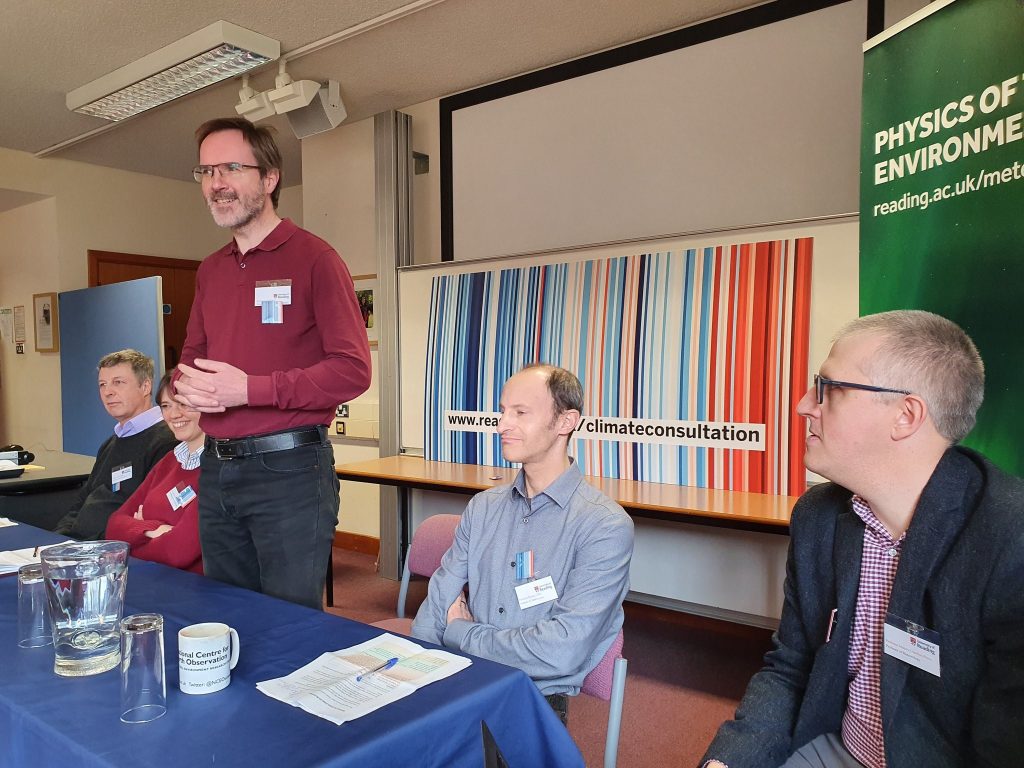From coronavirus to carbon storage, Reading climate scientists invited local school children to ask them anything on 13 March for British Science Week. Here are some of the burning questions they put to Andrew Charlton-Perez, Bill Collins, Laura Wilcox, Nicolas Bellouin and Richard Allen.

Panel members Professor Bill Collins, Dr Laura Wilcox, Professor Nicolas Bellouin, Professor Richard Allen and Professor Andrew Charlton-Perez, who chaired the Q&A.
What do you think that the UK government should be doing to reduce the effects of climate change?
Nicolas: Legislation for home policies and a transition towards a low carbon economy. And world governance – we need countries to show the way, particularly those countries that have contributed much to the emissions. Big companies are important.
Richard: UK government is already taking actions but these actions need to be ramped up. We need to move away from heating our home with gas. We need to change to renewables and away from the reliance on personal cars. Food is a key part – low carbon food is needed.
What things do we do in our everyday lives that have the biggest impacts on climate change? What could we change to have less of an impact?
Nicolas: Pester your parents to vote well for parties with good climate policies. Your generation will have to pay for CO2 removal – which will be a huge cost. This problem needs good political leadership.
Laura: don’t feel you are personally accountable all the time. The big changes will come from big companies and business.
Bill: This needs whole world wide change – governments want to put it on us, but we need new infrastructure to change our emissions. Changing the way we heat our homes is a huge challenge.
What would happen to the carbon that we remove from the atmosphere? Where should we put it?
Bill: the best way to store carbon is underground, e.g. growing trees or putting charcoal in the soil. Alternatively, pumping CO2 into old oil wells – but the technology is still being developed.
Would going vegan or vegetarian help us with climate change?
Nicolas: The carbon footprint of meat is large. Cutting down on meat is a good thing! Switching to plant based food impacts on water and land requirements as well.
How can we access sustainable energy resources more economically?
Good question. The cost of renewables has been decreasing in the UK for quite some time and is below the cost of coal generation. There are even predictions the cost will drop below that of gas generation in the next few years.
How will the government tackle the global agriculture issue, as it is the main cause for climate change with 65% nitrous oxide emissions coming from animal farming industry?
This recent report by the UK Committee on Climate Change gives some useful pointers to how agriculture might adapt. Bottom line – increase tree planting and reduce beef and lamb consumption.
Are we seeing any atmospheric impacts due to the coronavirus pandemic?
There are a few impacts. Laura works on air quality – we are seeing less particulate matter over China at present.
Bill: We have seen some short-term effects over China, but it won’t have a long-term effect on climate, unless it causes a long term change in behaviour. If we all decide to stop flying long-term then it will have a long-term effect.
Do you worry that coronavirus could be distracting global governments from the issue of climate change? Could it slow down our efforts to stop climate change?
Nicolas: Governments are right to be worried about coronavirus. Where we see worry we see action, and when there is something at stake people are willing to change behaviour. Is the sense of emergency around climate change enough to make people change behaviour?
Richard adds: Over the coming century there will be challenges that face us, including challenges that we don’t yet know about. But with climate change, they have the potential to cripple countries, and so they will be less able to deal with these other challenges.
Laura: There are also questions around the planning of COP26 in Glasgow this year, as the planning has been affected by the virus.
What challenge in climate science would the panel like to see solved by the end of their careers?
Andrew: I want to see the ability to predict the weather on 4-6 weeks improved. This will help with people deal with climate change and extreme weather.
Laura: I want to see climate change solved! We should be at zero carbon emissions by the end of my career.
Bill: We want to understand what happens to the carbon we emit – where does it go in terms of oceans/land.
Richard: I want to see advances in technologies e.g. heating homes, storing CO2, battery technologies. Governments can act in an emergency – I want to see a workable solution to climate change.
See the full Ask Me Anything on Twitter by following #RdgCliSciAMA.
Questions were posed both on Twitter and in person by school students from Oakbank Secondary School in Wokingham and Robert Mays School, Odiham. Dr Laura Wilcox and Professors Nicolas Bellouin, Richard Allen and Bill Collins are all from our Department of Meteorology and are authors of the forthcoming sixth assessment report of the Intergovernmental Panel on Climate Change. The event was chaired by Professor Andrew Charlton-Perez, Head of Department (External Affairs) of the Meteorology department.
